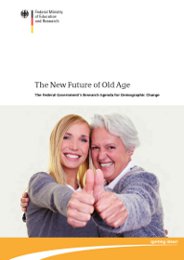Objectives of the Research Agenda
Demographic change is transforming our country. Average life expectancy in Germany is higher today than ever before – and will, in all likelihood, continue to rise. In the meantime, the population is shrinking, owing to sustained low birth rates. The consequence is a marked shift in the age structure of our country. According to forecasts provided by the Statistical Office, almost half the people in Germany will be over 50 by 2030, and nearly every third will be over 65.
Pooling questions
With this agenda, the Federal Government summarizes relevant scientific questions regarding demographic change and indicates important fields of action. The focus is on older people and in particular those who are in the last years of their work lives or already made the transition into retirement. At the same time we also take a look at the overarching social issues and consequences for society.
Older people are much better qualified, ablebodied and vigorous today than even a few decades ago. An increasing share of seniors of both sexes is able and would like to play an active part in social life up to an advanced age. Individual lifestyles and varied life plans replace the out-dated, rather negatively charged image of old age. This has recently also been confirmed by the Sixth German Government Report on the Elderly.
Cross-departmental and interdisciplinary research
With the measures stated in this research agenda, the Federal Government aims to promote the maintenance, use and multiplication of the valuable potentials of older age, whilst fostering the quality of life in old age. Not only seniors are bound to benefit from this, but all generations. The Federal Government consequently adjusts its research programmes to the challenges and potentials of a society of longer lives:
- In our "Health Research" framework programme, we have already placed a focus on improving the prevention, diagnosis and therapy of diseases particularly prone to occur in old age.
- We pay particular attention to dementia and the support of care patients and relief of caregivers. The responsible sectoral ministry concretely addresses these questions in a future workshop on the topic of dementia and the "Model Programme for Improving the Situation of Persons Requiring Nursing Care".
- We equally consider the role played by relatives in the provision of care by further developing measures for their relief and support, as for example in the project "Potentials and Risks in the Familial Care of Older People".
- We align the "Information and Communication Technologies 2020" programme accordingly: Funded are measures to promote the development of mobility and communication technologies that support the social inclusion of seniors, as well as innovations that provide residential and living environments with the appropriate designs for the elderly.
- We foster the development of innovative solutions to adapt municipal and social infrastructures. Issues that are being addressed in research projects and pilot schemes include public transport, the planning and construction of transport infrastructure, the provision of mobility in old age and road safety.
- We will adapt our research programmes targeted at life-long learning, workplace design, production technologies and innovative services in a way to ensure that seniors will continue to be able to contribute their experience to society even better and longer in the future – whether it is professionally, privately, or in volunteer work.
- In the framework programme "Humanities, Social Sciences and Cultural Sciences", we will increasingly fund the study of the basic issues associated with a society of longer lives.
These research efforts are aimed at bringing together the relevant scientific disciplines whilst placing a focus on action areas of special importance to seniors: mobility and communication, longer employability, housing, health and care, as well as social and cultural inclusion.


